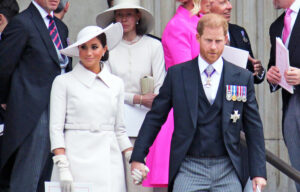It’s hard to ignore the ongoing media frenzy surrounding Prince Harry and Meghan Markle.
The tabloids seem to be in a relentless race to outdo each other, all while claiming they want the couple to disappear from the public eye.
But if that were truly the case, why are they dedicating so many pages to them?
The irony is palpable.
One seasoned journalist recently pointed out the absurdity of this situation, emphasizing how the very same outlets that profess disdain for the Sussexes are the ones feeding the fire.
The journalist, who has spent years on Fleet Street, expressed disbelief over how their former colleagues continue to churn out negative stories about Harry and Meghan.
He raised a crucial question: Why do they keep writing about people they claim to hate?
The answer lies in the simple fact that sensationalism sells.
By stoking public animosity towards the couple, these newspapers boost their circulation numbers, drawing in readers eager for the latest scandal.
However, this raises another question.
Why do audiences allow themselves to be manipulated in this way?
The journalist argued that many people base their opinions on what they read in the tabloids, often without any firsthand knowledge of the situation.
It’s easy to get swept up in the narrative when the media presents it as fact, especially when it comes to high-profile figures like Harry and Meghan.
Yet, this reliance on tabloid sources can lead to a distorted view of reality.
The journalist also highlighted the symbiotic relationship between royal correspondents and the palace.
Those who rely on the palace for their stories are unlikely to bite the hand that feeds them.
This creates a cycle where negative portrayals of the Sussexes are perpetuated, often with little regard for the truth.
It’s a system that benefits both the media and the monarchy but leaves the public at a disadvantage.
Interestingly, the journalist expressed a certain level of discomfort with the Royal Family itself.
He acknowledged that while many members may not be problematic, the institution fosters an environment where deference is expected.
This dynamic allows individuals like Jacob Rees-Mogg to present themselves as superior, which he found absurd.
In a society where such hierarchies exist, the media plays a significant role in shaping perceptions of who deserves respect.
As the journalist examined the coverage of Harry and Meghan, he noted the sheer volume of articles dedicated to them.
From claims of “war” to accusations of dishonesty, the headlines are relentless.
Yet, amidst this barrage of negativity, he questioned the media’s motives.
If they truly wanted the couple to fade away, why devote eight pages to them in a single issue?
The contradiction is striking.
In a world where pressing issues like rail strikes or economic crises loom large, the focus on the Sussexes seems misplaced.
The journalist pointed out that while the tabloids claim to want less attention on Harry and Meghan, they paradoxically give them more coverage than anyone else.
This obsession raises eyebrows and begs the question: What does this say about the priorities of the British press?
The journalist further argued that the media’s portrayal of Harry and Meghan often makes the public feel foolish.
When anger and frustration bubble up, it’s easy to direct that energy toward the couple rather than reflect on why these feelings arise.
This emotional manipulation serves the media’s agenda, keeping readers hooked on the drama instead of questioning the narratives being fed to them.
Turning the lens back on the newspapers, the journalist asserted that the real losers in this saga are the tabloids themselves.
Harry and Meghan have refused to play by their rules, opting instead to protect their privacy and dignity.
In response, the media has resorted to increasingly hostile tactics, particularly against Meghan, who faces discrimination based on her heritage.
Ultimately, the journalist called out the hypocrisy of those who vilify Harry and Meghan while consuming the very narratives crafted by their bullies.
He challenged readers to consider how often they let the bullies dictate their views, particularly in cases where victims of bullying stand up for themselves.
The media’s portrayal can easily skew public perception, leading to a collective misunderstanding of the situation.
As the coverage continues, it’s clear that this saga isn’t just about Harry and Meghan.
It’s a reflection of broader societal issues, including class, privilege, and the power dynamics inherent in the media.
The journalist’s observations serve as a reminder to critically engage with the information we consume, fostering a more nuanced understanding of the complexities involved in this ongoing narrative.

